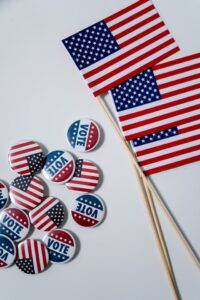Talking about politics often leads to heated debates, especially with people’s varying perspectives and deeply rooted beliefs. The 2020 election was one for the ages. With polarizing topics such as how to deal with the COVID-19 pandemic, the economy, and social unrest, tension filled our nation. Despite the rising emotions, U.S. teenagers and young adults have learned much during these past few months. This brief period before adulthood signifies the peak for exploring, discovering, and learning first-hand about the U.S. government, policies, and elections. Parents, as well as friends and other family members, influence beliefs. Social media and technology is at our fingertips, and it’s easier than ever to gather information and re-share it.
 No matter your gender, race, social status, or job, citizens have the ability and right to contribute to American society by voting. Some may feel like a drop of water in a vast ocean, but filling out a ballot is one of the most effective ways to affect society. According to The Washington Post, 63% of eligible people voted in this 2020 election, with 66.5% projected to have voted once all ballots are counted. The New York Times reports that fewer than half of American citizens ages 18 to 29 voted in the presidential election of 2016.
No matter your gender, race, social status, or job, citizens have the ability and right to contribute to American society by voting. Some may feel like a drop of water in a vast ocean, but filling out a ballot is one of the most effective ways to affect society. According to The Washington Post, 63% of eligible people voted in this 2020 election, with 66.5% projected to have voted once all ballots are counted. The New York Times reports that fewer than half of American citizens ages 18 to 29 voted in the presidential election of 2016.
The beauty of voting is that everyone is on the same playing field. A vote cast by an 18-year-old weighs the same as one from an 80-year-old. The process was designed to give everyone a chance to speak their mind and steer the nation into prosperity and unity. Making the most of this precious opportunity is something all young adults (and older adults too) should do.
So what do Coronado teens think — How do students feel about this election? From where do they get their information? Who or what influences their political opinions? Are they planning to pre-register to vote? How much do they actually know about the election and candidates running for office?
CHS freshman Evi Anderson was extremely candid in sharing her opinions. She was raised hearing a democratic point of view from her parents which cultivated her liberal opinions. Although she leans left, Evi makes an effort to research unbiased information. She mainly analyzes data from politifact.com, The New York Times, and MSNBC. Being educated and exploring various viewpoints, other than just listening to her parents’ beliefs, is important to Evi, and she seeks out that information. For this 2020 election, Evi wanted to learn about both President Donald Trump and former Vice President Joe Biden and their policies on controversial issues so she could be more knowledgeable and support what she stands for.
“I think I could definitely learn more about each side and their policies/candidates but I’d say as of this moment I think I would be informed enough to vote, at least presidentially,” Evi shared.
Evi is planning on pre-registering to vote. California residents are eligible to pre-register to vote once they turn 16 years old. Their registration will then automatically become active when they turn 18. Evi believes that voting is a civic duty, and that every eligible voter should voice their opinion through the ballots.
Sophomore Jack Gould also believes that voting is a moral obligation, especially for young adults. He researches on the web using Fox News and Prager University (commonly referred to as PragerU). Leaning conservative, Jack seeks to learn more about current events and news on the national level, which will prepare him for filling out his ballot during the next election.
“As soon as I am old enough to vote I will because I want to help contribute to the way I want to see the country,” Jack explained.
 Standing on middle ground, freshman Randy Castillo isn’t much of a political person, and he’ll decide about voting when the time comes. For now, he receives his information from other people and the news.
Standing on middle ground, freshman Randy Castillo isn’t much of a political person, and he’ll decide about voting when the time comes. For now, he receives his information from other people and the news.
Randy shared, “I don’t think I know enough about politics to vote. I don’t know enough to make my own opinions.”
Randy definitely speaks for a significant number of teenagers. Many simply do not know much about the government or politics. Especially with hot button issues and heavy controversy, some just do not want to choose sides. Differences of opinion can divide families, friendships, and communities. But learning the truth is not harmful, and being an informed voter can help to steer the course of the country, no matter how small and insignificant one may feel.
It is intriguing to learn what’s going on in the minds of those who are coming of age. They are the future of America who will decide the not-so-distant elections to come. Whether progressive, conservative, or in the middle, we have the opportunity to speak our mind through our ballot choices. For the 2024 election, teens age 14 and up as of November 5 will be eligible to vote and have an opportunity to influence the direction of our country.





